Whether you're fed up with Google Search returning lots of irrelevant results or you're simply trying to narrow down your search, there are certain things you can do to improve your experience on the world's most frequently used search engine.w
8 Search a Specific Site
One way to improve your Google search results is to narrow your query to a specific website.
For example, let's say you're looking for an online tutorial on how to use the SEQUENCE function in Microsoft Excel. Specifically, How-To Geek's Excel guides have helped you in the past, so you first want to check whether the site has covered this topic.
To do this, go to Google, and type:
site:howtogeek.com excel sequence function
Make sure you add a space between the website address and the search terms.
When you press Enter, only results from How-To Geek are displayed.
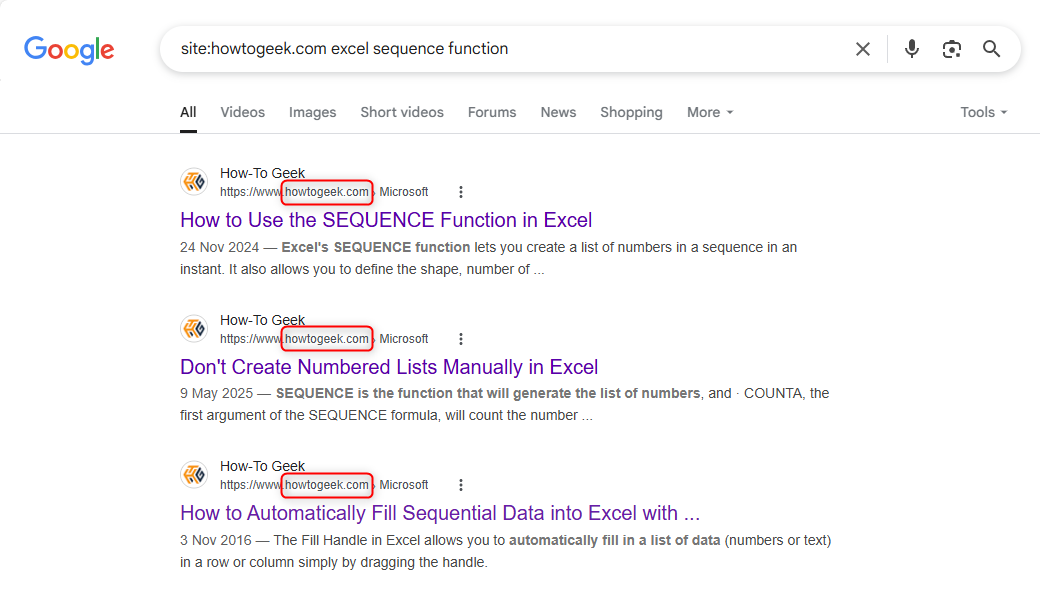
7 Search for Words Within a URL
When you enter a search into Google and press Enter, it scours many parts of a website, including both visible elements, such as textual content and page titles, and invisible elements, like alternative text on a graphic or meta-descriptions.
However, you can force Google to only return web pages where the keywords appear in its URL (the link in the address bar). This usually also means that the same keywords are in the page's title.
For example, to search for pages that contain "sheep" in their URLs, type:
inurl:sheep
If you type more than one word after adding the inurl: search term, Google returns results with any (not necessarily all) of the keywords in their addresses.
On the other hand, to make your search even more specific, you can force Google to return URLs containing more than one keyword. For example, typing:
allinurl:black sheep
narrows the search to URLs containing both "black" and "sheep."
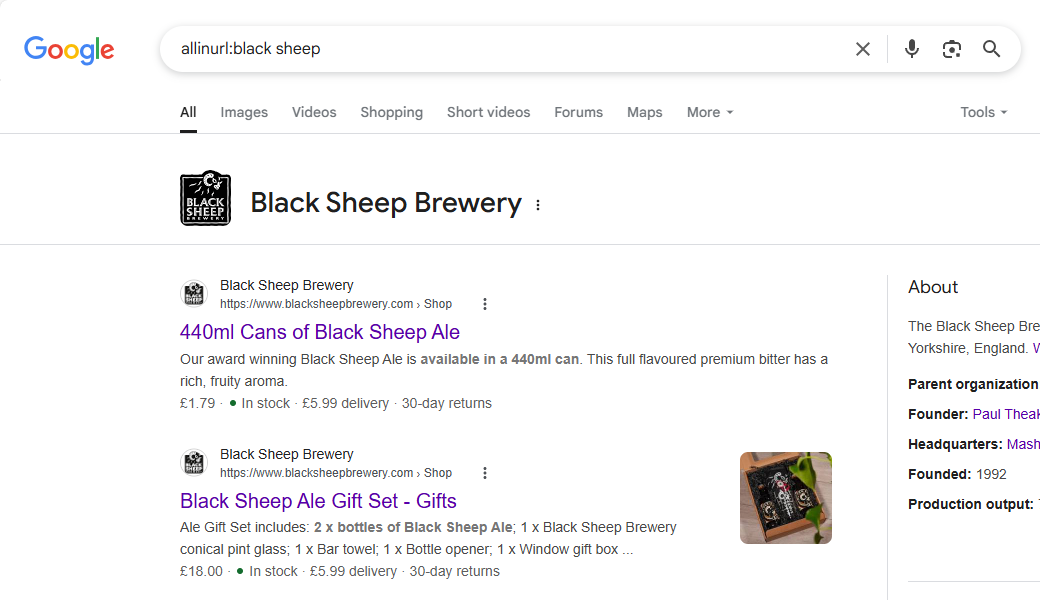
6 Search a Site Domain
Unfortunately, many websites are unreliable and can provide untrustworthy information. Luckily, you can refine your search to only return websites with certain domain suffixes.
For example, imagine you're doing your biology coursework and want to learn more about auxin. Specifically, you only want to see information posted on university websites.
To do this, type:
site:.edu auxin
Always check a website's URL and related sources before trusting its content.
Note that all the results are websites with the .edu domain suffix.
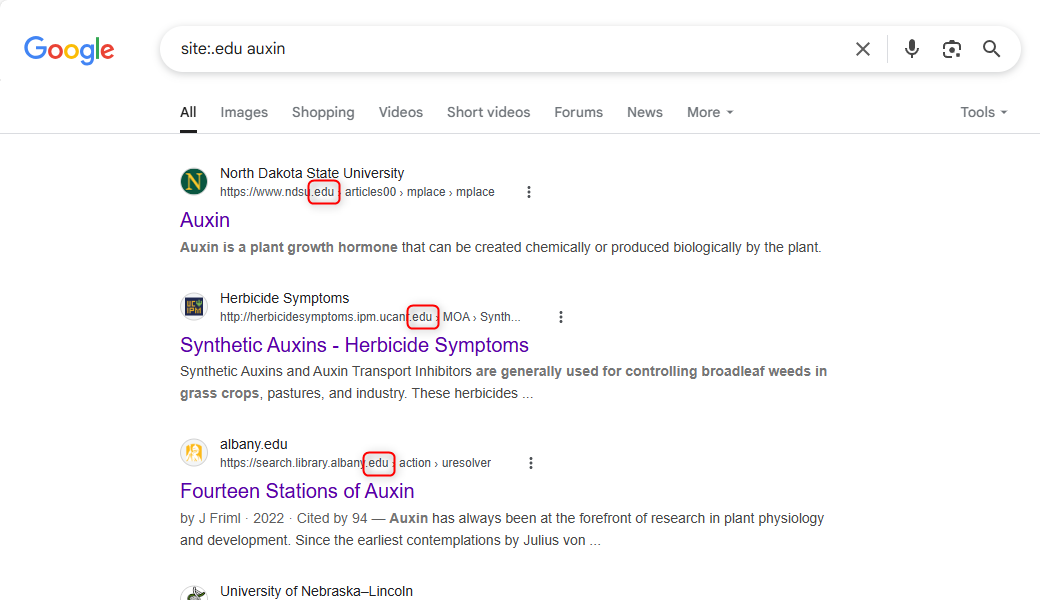
Similarly, to return only results from official governmental (U.S.) web pages, type:
site:gov
followed by the relevant keywords.
Universities and governmental bodies from different countries use different domains. For example, most universities in the UK use the .ac.uk domain extension.
Searching a domain is also useful if you're looking for results from a certain country.
Here, typing:
site:.co.uk football
only shows results from websites registered in the UK.
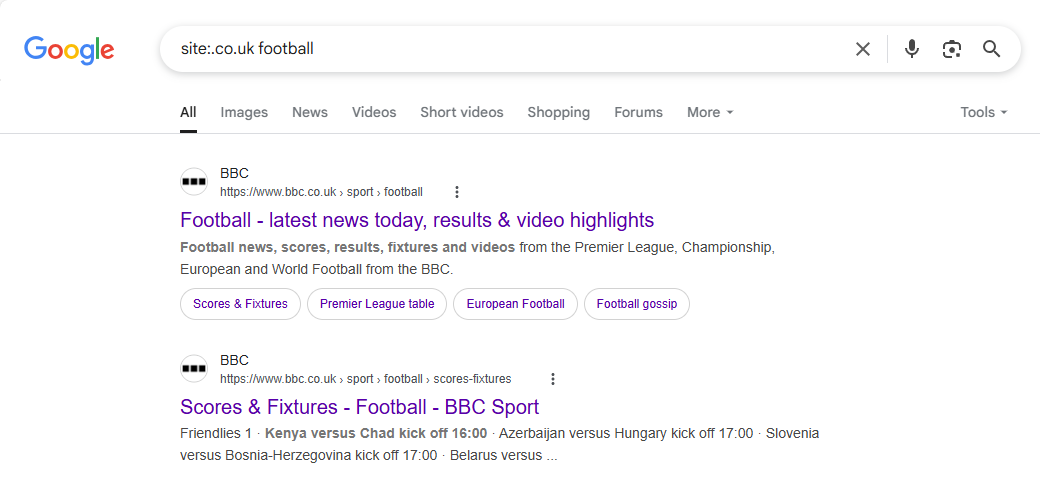
5 Search for a Specific File Type
Google Search lets you narrow your search to specific file types.
For example, let's say you want to read the user manual for the Samsung Galaxy Tab A9+. If you don't refine your query, Google Search returns many types of results, likely meaning it'll take you longer to find what you're looking for. In fact, you want the first result to be a PDF of the manual.

Samsung Galaxy Tab A9+
- Brand
- Samsung
- Storage
- 64 GB
Samsung's Galaxy Tab A-series has plenty to offer without breaking the bank. The latest Galaxy Tab A9+ offers a vibrant 11-inch screen, a kid-friendly design, quad speakers, and more. Check it out!
To do this, type:
filetype:pdf samsung galaxy a9+
and press Enter.
Searches on Google are generally case-insensitive, so don't waste time capitalizing proper nouns.
Now, only PDFs show in the search results.
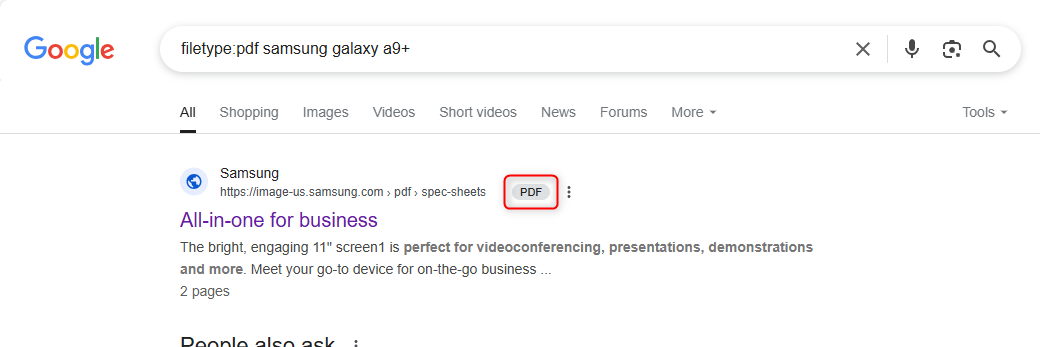
You could go one step further by searching for a specific file type on a particular website. For example, typing:
site:samsung.com filetype:pdf samsung galaxy a9+
searches for PDFs on the Samsung website relating to your keywords.
4 Exclude Words and Websites
Not many people realize how easy it is to refine the search terms on Google by excluding certain keywords from the results.
Imagine you want to cook a pasta meal, and you want Google to help you with ideas. However, typing "pasta recipes" into the search engine returns lots of chicken-based meals, but you had chicken yesterday, and you don't want the same type of food on two consecutive days.
So, to exclude the word "chicken" from the result, type:
pasta recipes -chicken
In other words, add a hyphen directly before the word you want to exclude, and none of the results will contain that word.
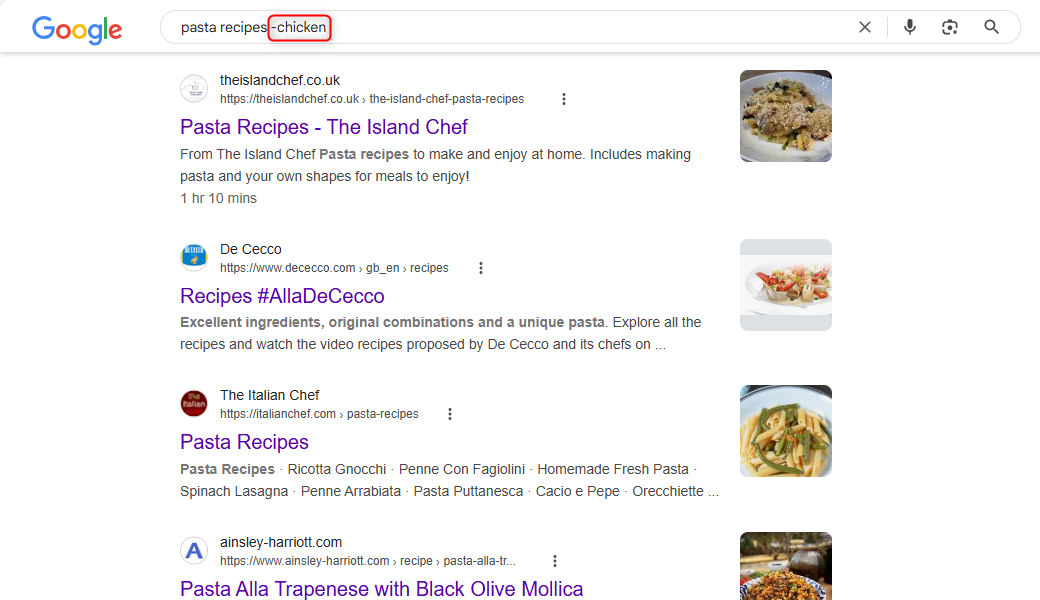
To exclude more than one word from the results, add a space and repeat the process. For example, typing:
list of pizza toppings -pineapple -avocado -mushroom
returns pages that list many different types of pizza toppings, but not pineapple, avocado, or mushroom.
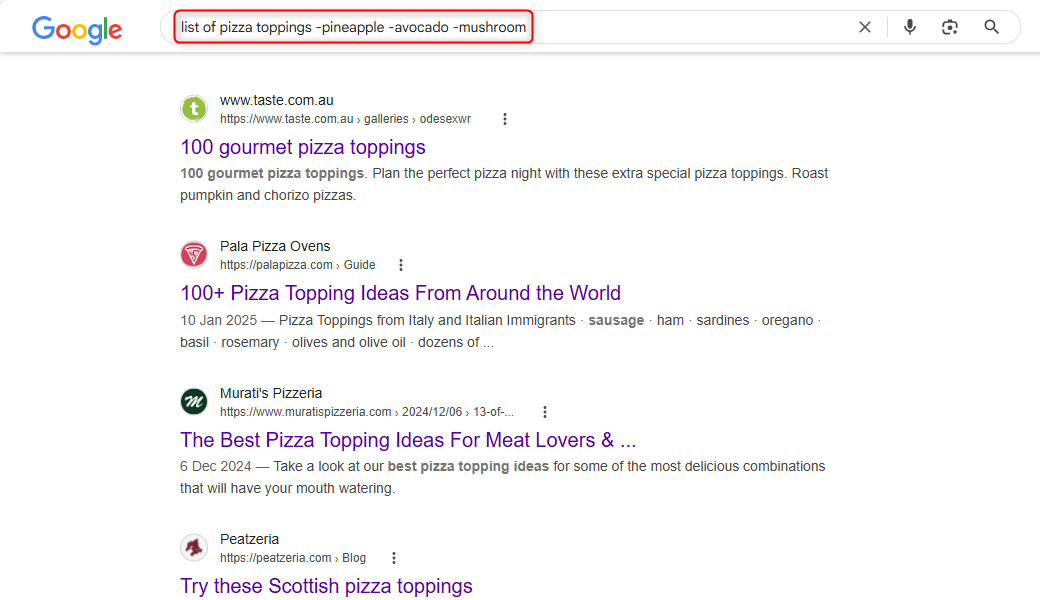
The excluded words can be placed anywhere within the search, as long as they're each preceded by a hyphen and separated from any other search terms with a space.
You can also exclude website-specific words from a search to ensure you don't see results from a certain site. For example, typing:
boolean logic -wikipedia -reddit
returns web pages that explain what Boolean logic is, but you won't see Wikipedia or Reddit anywhere in the results.
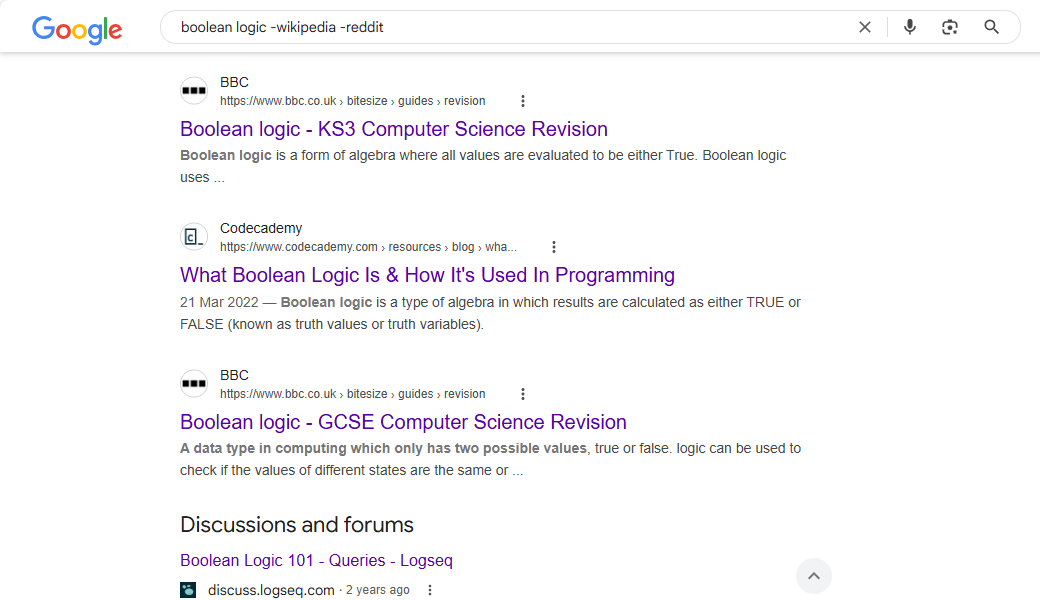
3 Use "Stop" Words Wisely
Don't fully believe the myth that Google Search ignores common words—also known as "stop" words—like "a," "the," "in," "this," and pronouns such as "they."
Although it's true in some cases, search engines are increasingly able to identify the nuances of certain stop words in specific contexts.
In a straightforward example, the top three results for the search query:
who
relate to the World Health Organization.

However, typing:
the who
returns results relating to the rock band.
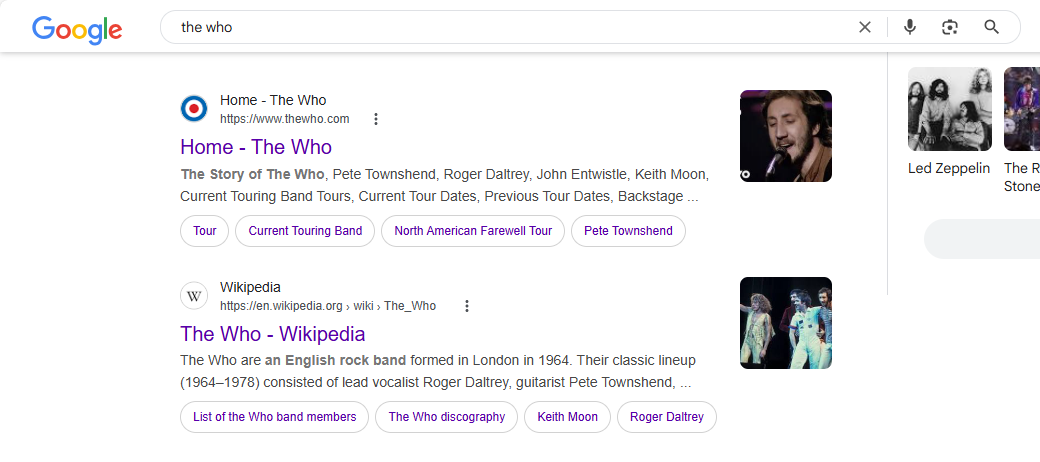
On the other hand, the impact of stop words on Google search results can be more discrete. Here, typing:
the best tourist attraction in america
places a travel review website at the top because the word "the" opens up opinion-based results.
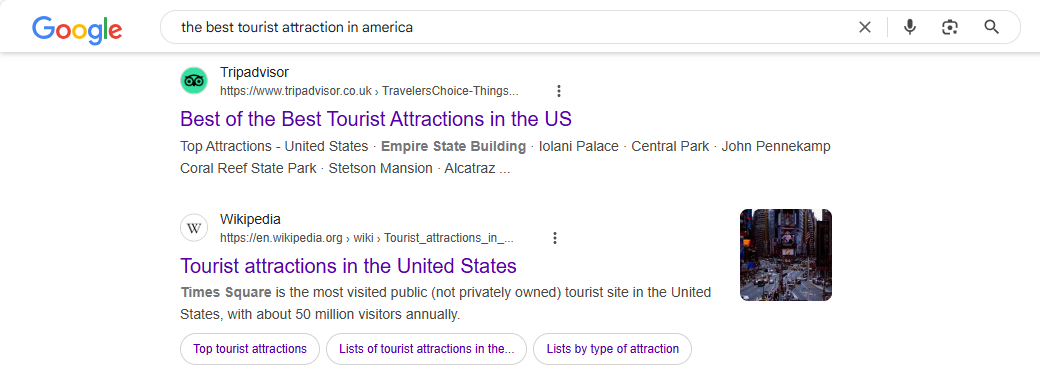
Removing the word "the" pushes the Tripadvisor result down one place, and replaces it with a Wikipedia article.
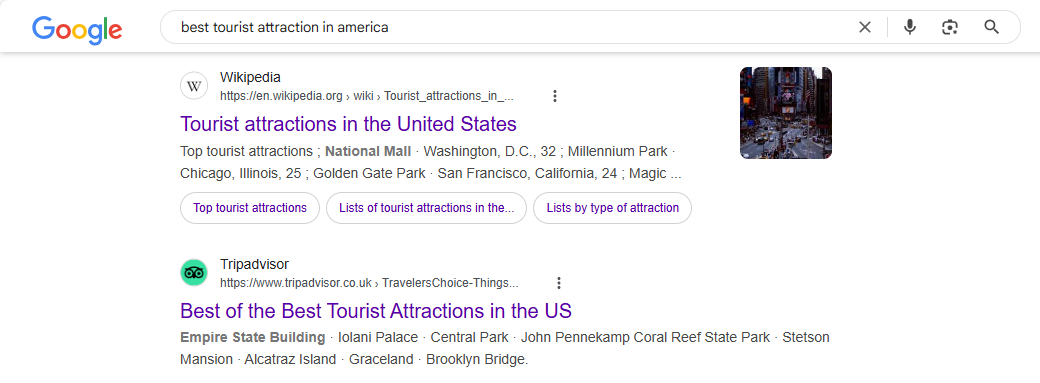
2 Search for an Exact Match
You can force Google Search to show web pages that contain specific word strings in their URLs, titles, meta-descriptions, or content.
Let's say you're looking for advice on improving your golf swing, so you type:
improve driver swing
However, when you review the results, they don't actually contain those words in that order. Instead, they contain some or all of the keywords in random places, or words relating to the keywords.
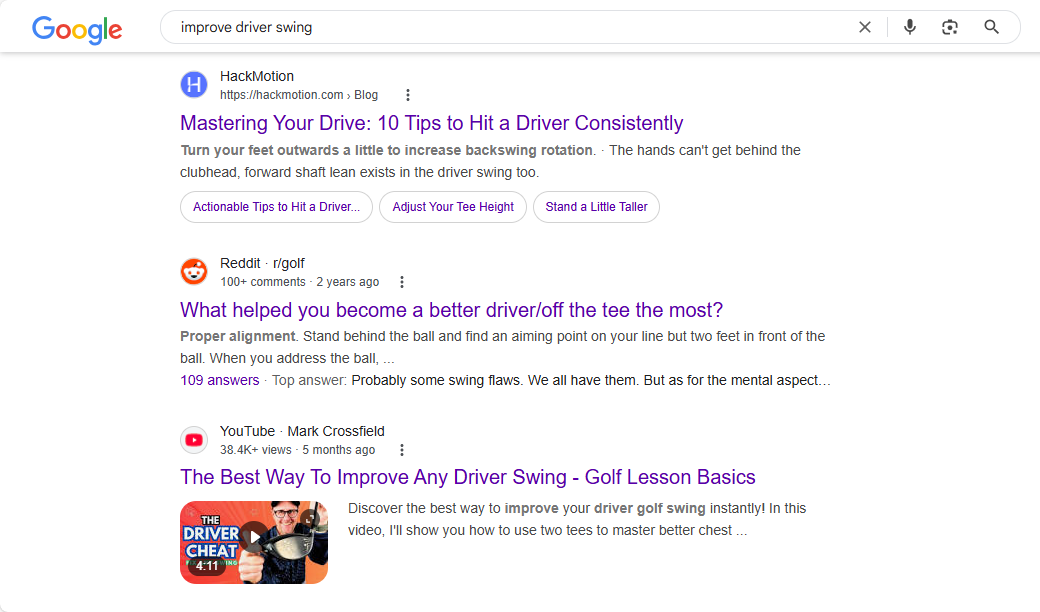
Instead, enclosing words you want to keep together in quotation marks, like:
improve "driver swing"
prioritizes results matching that specific term.
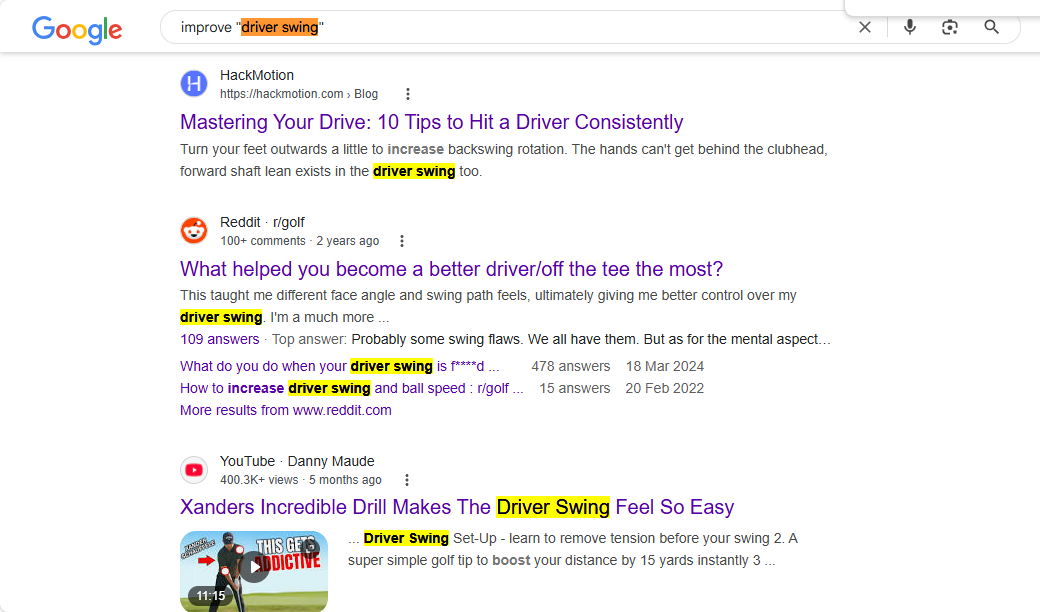
This is a handy trick if you know exactly which search phrase you're looking for. However, bear in mind that it significantly alters the results, so use it carefully!
1 Use Built-In Search Tools
As well as using the tips in this guide, make the most of Google Search's tools embedded within the website.

16 Google Search Features You Should Be Using
It can do much more than just find links on the internet!
For example, after you perform a search, click the different options on the banner to see certain types of results, like images, videos, or shopping websites.

The search options are reordered according to the search terms entered. For example, if you use keywords relating to a topical issue, Google Search moves the News tab closer to the left-hand side of the banner.
You can also further refine your search by clicking "Tools" on the right-hand side of the banner.
Here, as well as showing results within a certain timeframe, you can launch the advanced search, where you can limit the search to specific languages, regions, or other criteria.

By default, Google Search places AI-generated summaries at the top of the search results for increasing types of search queries. However, you can hide the AI overview results in Google Search by clicking "Web" in the options banner beneath the search terms field. As soon as you do this, the page reloads and displays only web page links.




